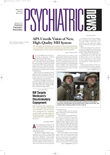Long before the 2000 Institute of Medicine report on medical errors was released, the Institute of Living, a psychiatric inpatient service of Hartford Hospital in Connecticut, was using computers to improve patient safety.
The mastermind behind the institute’s Clinical Evaluation and Monitoring System (CEMS) is psychiatrist John Goethe, M.D., director of the Burlingame Center for Psychiatric Research and Education at the Institute of Living.
“I have had a longstanding interest in using computer systems to optimize patient treatment,” he said in an interview. “In the mid-1980s, I translated best practices for using psychiatric medications into an automated medication monitoring system with the help of a computer programmer and considerable staff input.”
The pharmacology information on psychiatric medications includes doses, indications, side effects, and therapeutic serum levels. Decision trees guide drug selection, said Goethe.
In the late 1980s, with staff input, he expanded the pharmacology component to include all medications, laboratory tests, patient demographics, and additional clinical care issues such as pre-ECT workup, said Goethe.
He later developed automated diagnostic checklists, information alerts, and an outcome assessment program that were added to the pharmacology component.
Each psychiatric diagnosis has a separate automated checklist that reflects DSM criteria, said Goethe. The assessment component involves clinical staff interviews of each patient at admission and discharge using a brief questionnaire to evaluate patient functioning and productivity. Each patient is contacted at one, six, and 12 months postdischarge to assess functional status and subsequent psychiatric treatment received.
Information alerts are computer-generated notices designed to ensure compliance with best practices and medication protocols. For example, when a physician enters valproic acid into the pharmacology component, the system alerts him or her to order liver function tests if needed.
A physician can comply with the information alert or enter an explanation for not conforming to the recommended procedure. If an attending physician doesn’t respond to an information alert that is clinically urgent, the system alerts the chief psychiatrist, who responds immediately on behalf of the physician. The chief psychiatrist discusses the matter afterward with the attending physician. If the matter is not clinically urgent, it is dealt with administratively, according to Goethe.
The CEMS is used by the entire psychiatric staff and has led to a decline in medication errors and medical errors involving medications, according to Goethe. “For example, before we used the CEMS, we had about six incidents of toxic blood levels of clozapine annually. Now we have none,” he said.
Harold Schwartz, M.D., a psychiatrist and chief of the department of psychiatry at Hartford Hospital, told Psychiatric News, “The staff have certain incentives to respond to the information alerts. When they ignore them, they have to answer to me, and their performance is a measure used in reappointments.”
Schwartz said the CEMS is a valuable quality-management tool. “It alerts physicians in real time when they need to take certain actions. It can also be used to educate the medical staff about prescribing patterns and for documentation for accreditation by the Joint Commission of Healthcare Organizations (JCAHO),” said Schwartz.
Goethe has used the CEMS as a research tool and has published papers on its effectiveness. “The system also is more efficient than searching patient charts manually,” said Goethe. Only key elements of the patient’s medical record—such as name, date of birth, and diagnosis—are entered into the CEMS rather than the entire medical record, which Goethe said is unnecessary to reduce medical errors.
Miles Shore, M.D., co-chair of APA’s Task Force on Patient Safety, told Psychiatric News, “I am pleased that many colleagues are concerned about error prevention and are playing a role in their institutions in creating programs to reduce errors. Progress in psychiatry must rest on progress in the whole institution.”
Shore continued, “Computerized order entry [CPOE], for example, cannot be limited to psychiatry in general hospitals but must be part of an institution-wide effort.”
Goethe mentioned that a new CPOE system will be installed in the department of psychiatry in the fall and throughout the hospital next year.
A description of the Institute of Living CEMS is available at the Institute of Living Web site at www.instituteofliving.org/CEMS.htm. ▪
